I’ve visited a lot of Florida’s historic sites, so I was stunned to discover one of the best ever – and I had never heard of it.
Chinsegut (pronounced ChinSEEgut) Hill Historic Site in Brooksville, operated by the Tampa History Center, is a well-preserved pre-Civil War plantation. It looks like your stereotype of the grand white-columned Gone with the Wind mansion.

But that period is just one chapter in a story full of colorful characters, as the estate becomes the home in the 20th Century of suffragists and labor union activists. These owners welcome celebrity visitors including Helen Keller, Thomas Edison, J.C. Penney and Henry Ford to this remote hilltop in Florida’s countryside.
Throughout its history, a key role is played by African American men and women who were once enslaved here and whose photos and lives are featured prominently. Their stories are a big part of what makes this place fascinating.
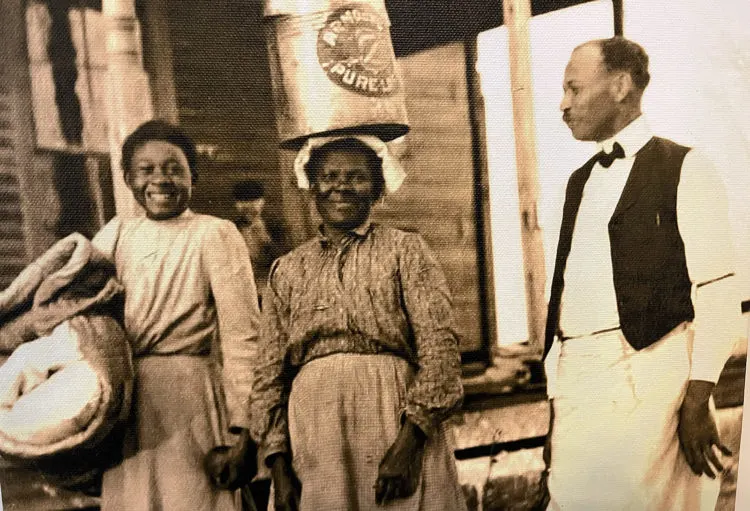
Unfortunate pandemic timing for a debut
So if Chinsegut Hill, built in the 1850s, is so historic and has been here so long, why hadn’t I heard of it?
For years, it was owned by the University of Florida and the University of South Florida and used as a conference center. From 2008 to 2019, the local Friends of Chinsegut Hill operated the property, working to preserve it.
Finally, Tampa Bay History Center partnered with Hernando County to manage the site. They agreed to make the central focus of the site be telling its many faceted historical story.
Chinsegut Hill was ready to make its first big public debut – in February, 2020.
Of course, you can imagine the rest of the story. Thanks to the pandemic, the site had to shut down for months and it is taking longer to get the word out about the property and the excellent tour here.
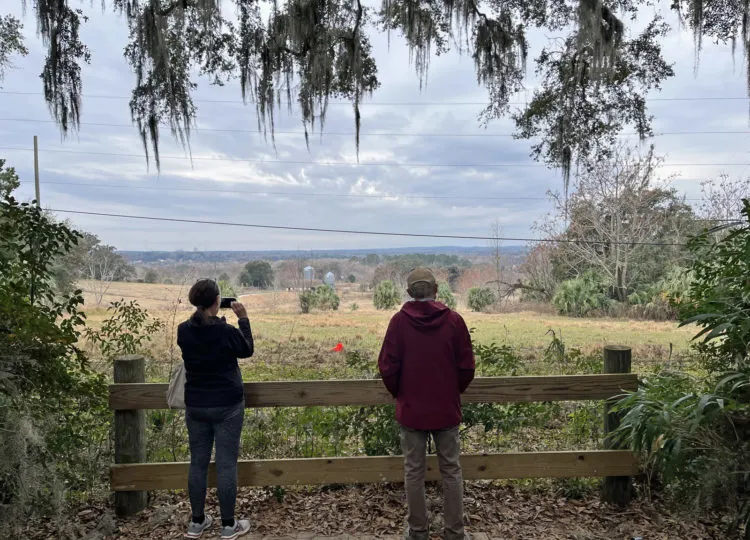
Chinsegut Hill: And what a hill it is
At 269 feet, Chinsegut Hill is one of the highest spots in the Florida peninsula, second only to the hill at Bok Tower, which is 298 feet.
Like Bok Tower’s location on the Lake Wales Ridge, Chinsegut Hill is on a ridge that poked out of the sea when most of Florida was underwater two to five million years ago.
This hill is what drew the original homesteader here. Bird Pearson, a South Carolina lawyer, scoped out this location and claimed it as soon as the Armed Occupation Act made homestead land available in Florida in 1842. Pearson, who brought 20 enslaved people with him to begin farming, went on to become a Florida Supreme Court justice. He sold the plantation to a second family, who continued operating it as a plantation until slavery was abolished.
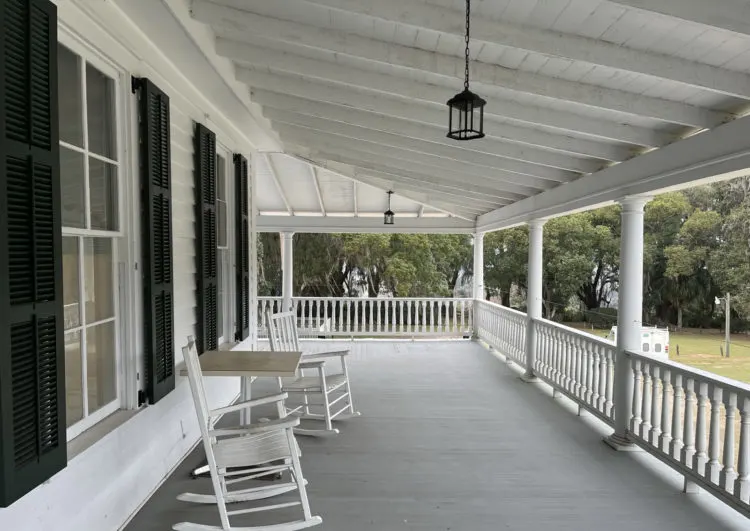
I won’t tell you the whole story of these years – there are so many interesting twists — except to say that Elizabeth Carr Washington, brought here as a slave from South Carolina when she was 12 or 13 years old, is one of the stars. She lived at Chinsegut Hill until her death at age 90 in 1938, longer than any other single person. She became a midwife who helped hundreds of black and white babies be born, and was matriarch of a family that kept the estate going for decades.
Her son-in-law, Fielder Harris, was named foreman of the estate. It was a remarkable thing: A black man supervising employees of both colors during the Jim Crow era.
Luckily, there are photographs of both Elizabeth Carr Washington, Fielder Harris and other family members and they are prominently displayed in the house, helping bring their stories alive.
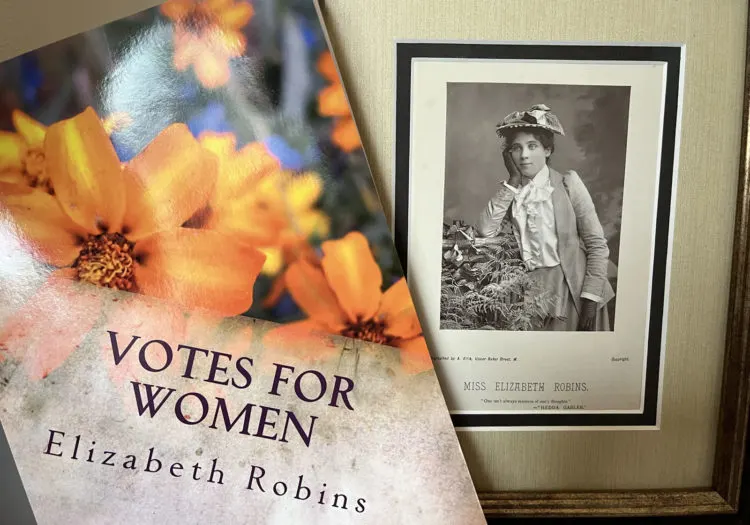
The progressive era of celebrity residents and visitors
The owners and residents in the 20th Century are just as surprising. They include a famous actress and suffragist author, Elizabeth Robins, who helped her younger brother, Raymond Robins, buy Chinsegut Hill in 1905 from the family that had lived in it during and after the Civil War.
Raymond Robins had lived with an aunt and uncle in the region as a youth and fell in love with this area and this house. Robins married another politically active woman, Margaret Dreier, a labor activist who was president of the Women’s Trade Union League.
Between the three of them, they were close to many in progressive circles, and thus entertained people like Helen Keller, who was also an ardent suffragist. Margaret Dreier knew the industry leaders, like Ford and Penney, through her labor activities.
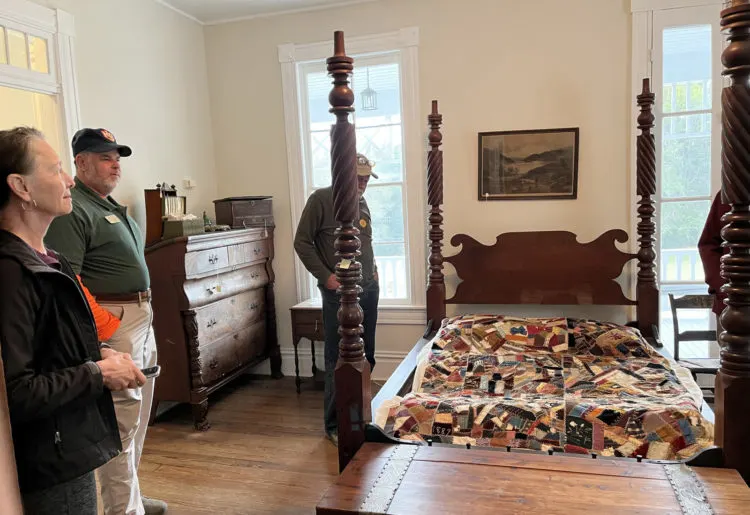
Visiting Chinsegut Hill
Just 15 minutes north of Brooksville, Chinsegut Hill is open for guided tours on Saturdays and Sundays from 10 a.m. with the last tour at 4 p.m. Tours are $5 (likely to increase) and you should reserve in advance.
I loved our tour, led by the very knowledgeable site manager Ross Lamoreaux. If you fear you are going to get another wooden narrator reciting dates, don’t worry: Expect instead a captivating storytelling approach.
There are plenty of quirky anecdotes. For example, actress Elizabeth Robins married an actor who was despondent over living in her shadow and killed himself by donning a suit of medieval armor and jumping in Boston’s Charles River. When Elizabeth learns the Chinsegut estate is for sale, she wants to tell her brother, so she travels alone for nine months to Nome, Alaska, where Raymond has joined thousands in the Klondike Gold Rush. After arriving in Nome, she locates him in 15 minutes. (When he purchased it, Raymond renamed the house Chinsegut, which is Inuit for “spirit of lost things.”) Elizabeth Robins wrote a book about her trip to Alaska.
The house itself is interesting, beautifully and carefully restored. On the second floor, many of the furnishings are from Raymond and Margaret Robins, including a rope bed that looks like it would be a torture machine if used. (They say it was.) It dates from the 19th Century and was a sentimental favorite from Raymond’s youth.
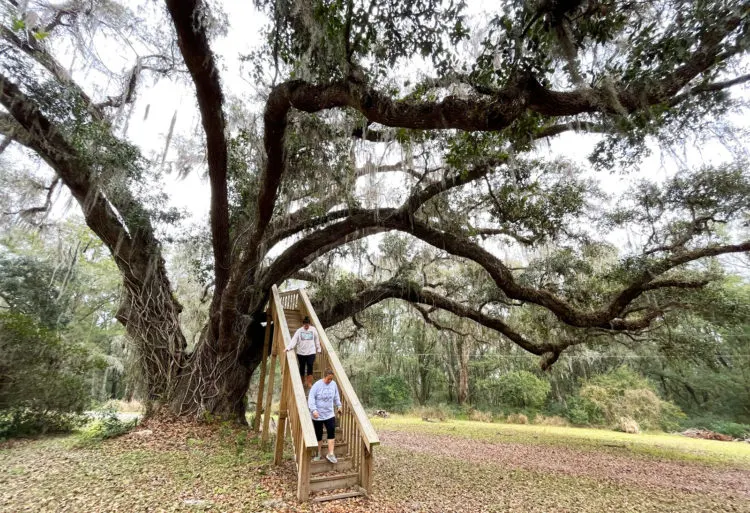
Enjoying the grounds at Chinsegut Hill
You can visit the grounds without paying for a tour. The property has a very good self-guided tour with signs that talk about the estate’s residents and point out key elements of the property.
My favorite: Steps built high into a 100 year old live oak to show where Raymond Robins had built himself a tree house to watch the sunrise.
The grounds were originally covered with pine trees but during the Robins’ residency, it was landscaped with oak trees that have become magnificent specimens, azaleas, camellias and other decorative vegetation.
Surrounding the hill, there are undeveloped park lands and a ranch that is operated by students from Florida A&M University.
There is a two-hour guided nature walk offered monthly into the area around the hill.
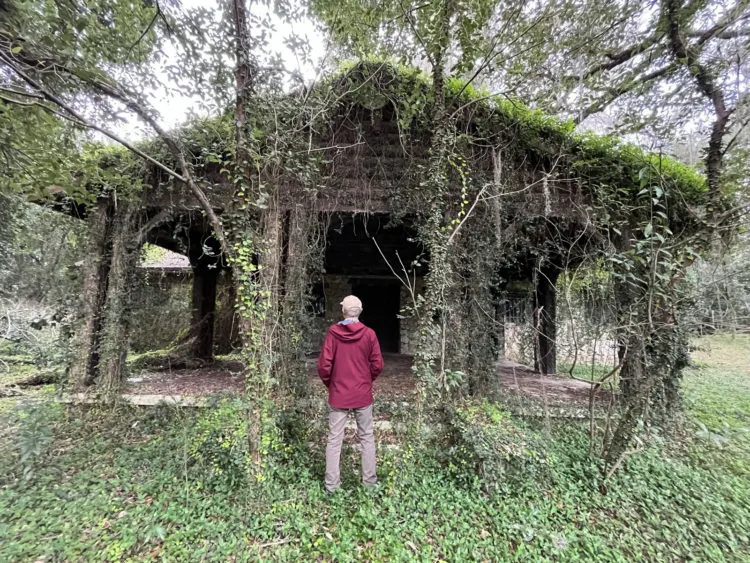
With information from the Chinsegut staff, we took our own stroll off the grounds, down the hill to nearby Lake Lindsey to see a 90-year-old stone structure built by Civilian Conservation Corps workers, who were based at Chinsegut Hill. The trail is overgrown and we were warned it was steep. (We didn’t find it steep.) We loved the stone building, so covered with vines and vegetation that it looked magical and/or haunted.
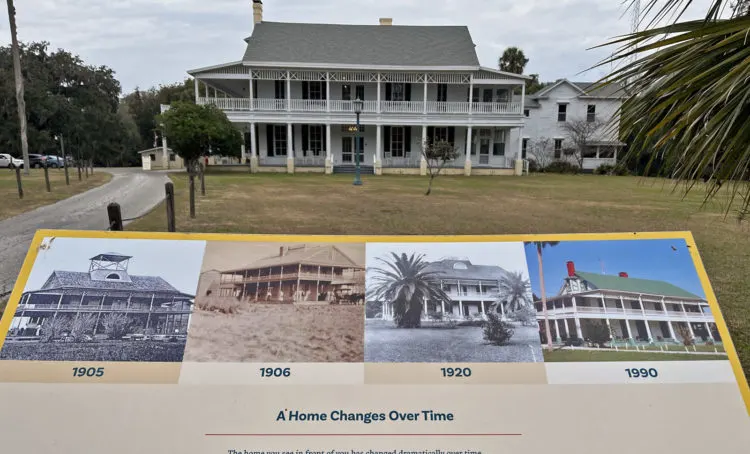
Making a day of visiting Chinsegut Hill Historic Site
Chinsegut Hill can be a daytrip from Tampa (55 miles), Orlando (70 miles) and The Villages (40 miles.)
We included Chinsegut Hill on our visit to the area where we found many other excellent things to do:
- Canoeing the spectacularly beautiful Withlacoochee River.
- Biking the Withlacoochee State Trail, which might be my favorite Florida bike trail.
- Visiting lovely, evocative Dade Battlefield Historic State Park in Bushnell.
- Hiking a four-mile loop hike at nearby Ridge Manor Trailhead in Withlacoochee State Forest.
- Near the property, there are a few short hikes at the Chinsegut Wildlife and Conservation Area and there are many trails in the state forest.
If you go: Chinsegut Hill Historic Site
22495 Chinsegut Hill Road
Brooksville, FL 34601
352-770-2188
The Chinsegut Hill Historic Site is open Saturday and Sunday 10 a.m. – 5 p.m. Guided house tours are available, with the last tour beginning at 4 p.m. Please purchase tickets ($5) in advance. Children ages 6 and under are free.
Lodging when visiting Chinsegut Hill
Chinsegut still has a conference center with cabins, but new reservations are not being made at this point. When they again accept reservations, I’d love to stay here. The cabins look appealing and the hilltop is beautiful.
Most accommodations in Brooksville are chain hotels located at the I-75 interchange. Brooksville has a few bed-and-breakfast inns in town, Dolan House B&B, The Mirador and Arendales Guest House, plus a few mom-and-pop motels. You’ll find accommodations on Airbnb too.
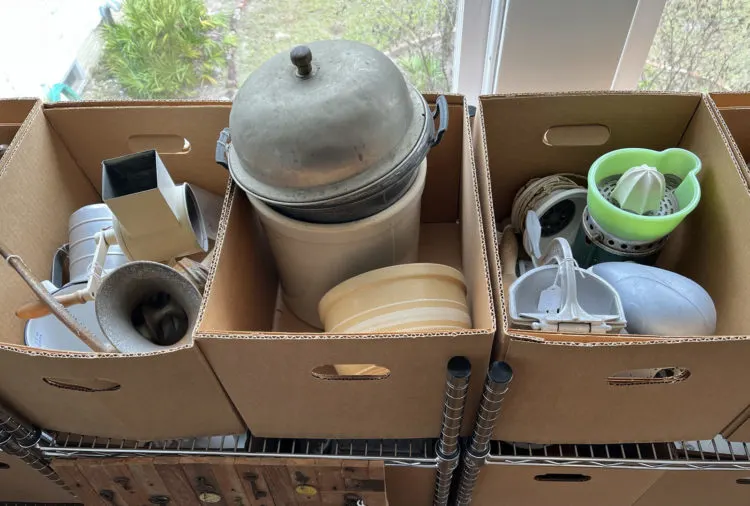
Camping near Chinsegut Hill
Campsites are available in the Withlacoochee State Forest. The forest’s 131 campsites are available on a first-come, first-served bases. See posted information about camping fees. The rate is $20 per night from April through October for sites with electric hookups. Sites in Crooked River, with water only, are $15. Fees are collected on the honor system at the campground entrances.
- Buttgenbach Mine Campground in the Croom Motorcycle Area: 51 sites with electricity, water, picnic tables and fire rings. Dump station in campground. Warning: It can get noisy here, especially on weekends, because of the motorcycles and off-road vehicles.
- Silver Lake Campground in the Silver Lake Recreation Area: 23 sites with electric, water, picnic tables and fire ring. Dump station in campground.
- Cypress Glen Campground in the Silver Lake Recreation Area: 34 campsites with electric, water, picnic table and fire ring. Also features kayak launch, nature trail and boardwalk.
- Crooked River Campground in the Silver Lake Recreation Area: 26 primitive sites (tents only) with water, picnic table and fire ring. Restrooms and showers.
- For more information on Withlacoochee State Forest Camping, contact the Florida Forest Service office in Brooksville at 352-754-6896.
Brooksville has several excellent restaurants
There was a 45-minute wait at an excellent place we loved in the last visit, Florida Cracker Kitchen. So instead we went across the street and had delicious food in an adorable historic house at Mallie Kyla’s Café. (If you don’t dine here, DO stop by for dessert. So good.)
If you enjoy visiting historical sites, you’ll enjoy my story Ten best historic places in Florida.
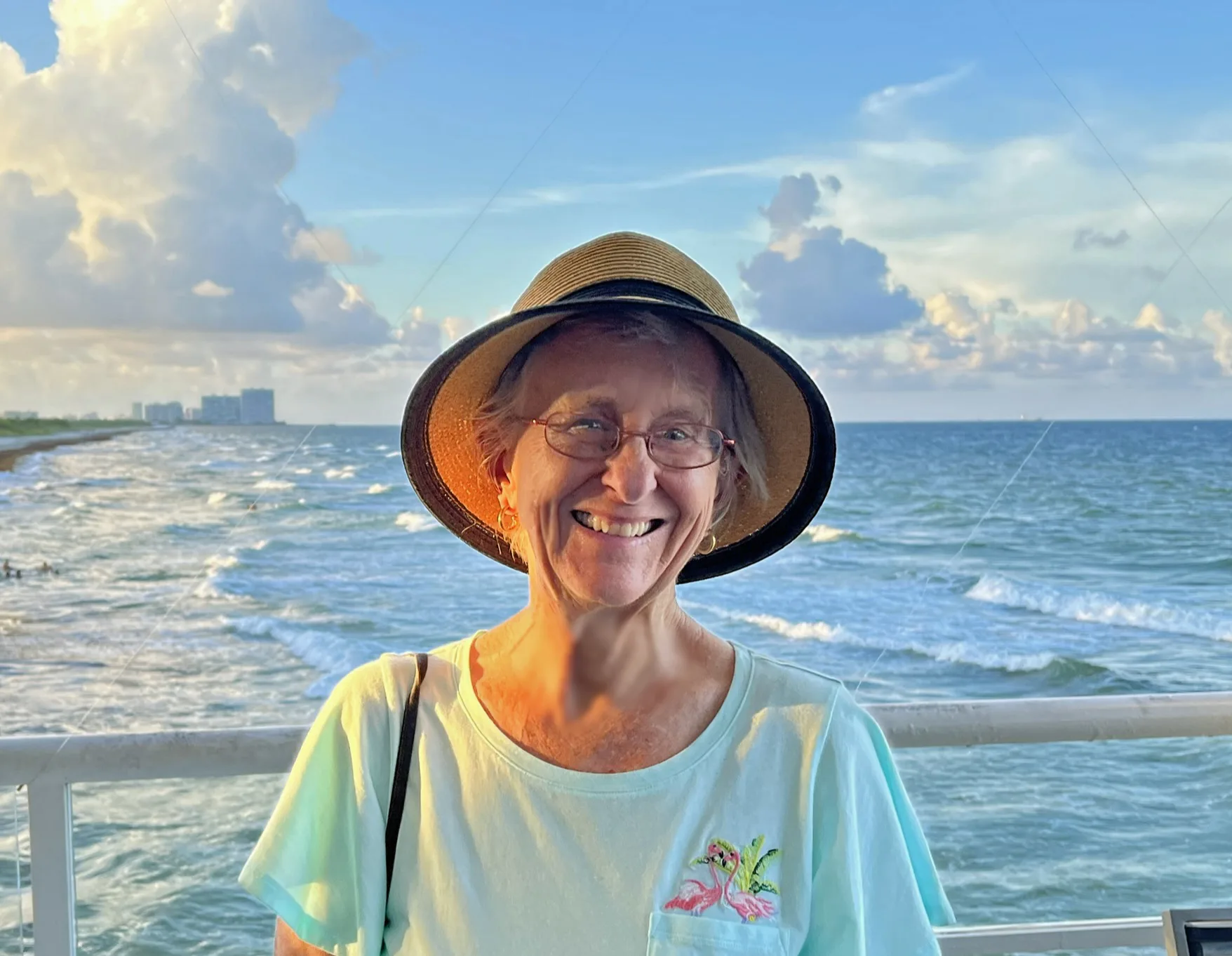
The author, Bonnie Gross, travels with her husband David Blasco, discovering off-the-beaten path places to hike, kayak, bike, swim and explore. Florida Rambler was founded in 2010 by Bonnie and fellow journalist Bob Rountree, two long-time Florida residents who have spent decades exploring the Florida outdoors. Their articles have been published in the Sun Sentinel, the Miami Herald, the Orlando Sentinel, The Guardian and Visit Florida.
